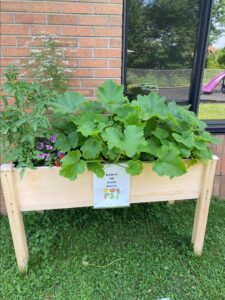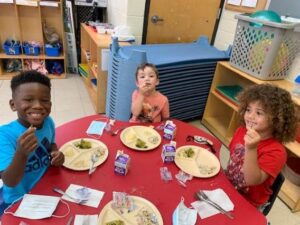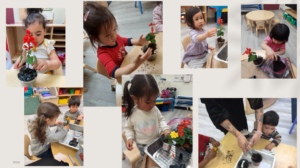Playing outside is a wonderful way for children to learn about their world.
Working with children and families to create, build, plant, and tend gardens is a great way to connect children and families to nature.
That’s why the 2021-2022 GroMoreGood Garden Grantees wasted no time starting and expanding their gardens!
Below are some examples of the many ways gardening can support young children’s learning across the various Head Start Early Learning Outcomes Framework (ELOF) learning domains .
Garden Grantee: Raleigh County Community Action Association

Raleigh County Community Action Association (RCCAA) in Beckley, WV, has used its grant to build raised garden beds for each of its classrooms. “Each classroom picked a theme and designed a garden around that concept,” RCCAA shared. “In April, students started seedlings as a learning initiative. Students watered and cared for the seeds while learning about how food items start out as seedlings and grow into thriving plants. By May, it was transplant time. Head Start kids transplanted seedlings outside into raised beds and were given the responsibility to water and maintain the beds.” Now, the children are enjoying the fruits of their labor! Families were invited to RCCAA for a harvest day, learning about and sampling all their children planted, including strawberries, lettuce, and more.
Supports Cognition
Being outdoors and gardening helps children get a closer look at wildlife and the lifecycle of plants. They observe the textures of tree bark, flower petals, plant stems, and leaves. They notice and compare the shapes, sizes, and weight of seeds, foliage, and produce. They solve problems as they figure out ways to pry away rocks and clear rubble. They use scientific reasoning to predict which seed will grow what vegetable. This is exciting and interesting work for young scientists and mathematicians!
Supports Language and Communication
Reading about gardening and talking about the growing process can expand children’s vocabulary. Rich conversations support their understanding of the world and enhance their cognitive abilities. Gardening offers lots of chances to write. Children can draw images and scribe labels to mark the various plantings. They can graph the heights as plants grow and chart the differences of leaves and flowers.
Garden Grantee: Taconi Head Start

New gardens are also well underway at Taconi Head Start in Ocean Springs, MS. With the help of community partners from the Jackson County Master Gardeners and Daughters of American Revolution, Taconi Head Start planted three types of gardens in May: a sensory garden; a butterfly garden; and an herb and vegetable garden. The sensory garden consists of rosemary and sage plants, where children can touch the plants and enjoy the smells; the butterfly garden consists of butterfly bushes and red salvia to attract butterflies in front of the school; and the herb and vegetable garden is where they planted basil, garlic, green onions, radishes, and tomatoes.
Supports Perceptual, Motor, and Physical Development
Children are tactile and sensory learners. They breathe in the fresh air and scents of plants and flowers. They experience the elements of weather and seasons. They practice balance by moving their bodies across grass and paths, through sand and soil, and over hills and valleys. They develop motor skills to hold and use tools. Growing herbs and produce can encourage healthy eating habits that help their bodies grow.
Supports Approaches to Learning
Starting and tending a garden encourages curiosity. Adults can wonder with children and watch what happens after planting seeds. The tactile and sensory experiences of gardening can help children self-regulate. The feel of the soil and smell of the earth may bring comfort. Gardens can help children begin to work independently as they plant seeds or pick produce. They practice patience as they wait for seeds to sprout and experience the benefit of delayed gratification as they wait for produce to ripen.
Garden Grantee: Maternity Care Coalition

The Maternity Care Coalition in Paoli, PA, also introduced children to gardening education this spring. “Some of our goals with this grant are to have children be able to eat the fruits and vegetables we grow, to send home spices and recipes to families, and to incorporate gardening into our curriculum,” they shared. Having prepared their outdoor space for a new garden and introduced children to gardening concepts in the classroom, they are well on their way to achieving these goals!
Supports Social and Emotional Development
For young children, gardening can support emotional functioning as they express delight or disappointment when plants thrive or struggle. They can work with adults and peers on various tasks and, with practice, begin to do more of these independently. For expectant families, starting seeds can begin a conversation around what it means to take care of something else. Learning about the individual needs of a plant can introduce the idea of understanding the individual needs of others.
Become a GroMoreGood Garden Grantee
Providing quality outdoor space connects children — and us — to nature. Whether you create a large bed or intimate potted garden with children and families, think of all the ways you help them have fun and grow while fostering key skills, behaviors, and knowledge within all the children you serve. The GroMoreGood Initiative makes grants, kits, educational curriculum, and training available to Head Start programs. We hope you are inspired to apply in the years to come!